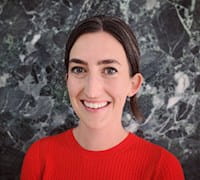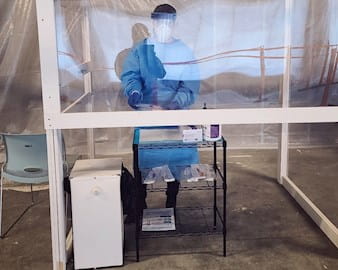Amanda Lee, Evening MBA student and Civic Scholar, Director of Practice Transformation at Access Community Health Network
Tell us about yourself
I'm actually a nurse practitioner. I did a post bachelor's nursing degree, and got my masters as a pediatric primary care nurse practitioner at the Yale School of Nursing. I've been practicing clinically in Chicago at the largest federally qualified health center network in Illinois. We have 35 community health centers and care for about 180,000 patients annually.
Over the past ten years my role within my organization has evolved quite a bit. I participated and eventually led our Pediatric Quality Committee, and then expanded more into focusing on the onboarding process of providers across our health centers. That was a really good opportunity for me to learn more about the organization and learn about what the different departments do and how all the pieces tie together.
Why did pursuing an MBA make sense for you?
When you're an upstream thinker, as you experience challenges, your brain is automatically going to ask what's causing this challenge? What are the things that I could do with my skill set to help address this? In community health, the list of challenges is very long and many of them lie outside of just providing healthcare. I thought about the challenges that I experienced as a new health care provider and the challenges that our patients experience in navigating health systems.
As my responsibilities changed I thought about what my natural skills were, what training had I already completed and what other challenges did I need to learn about to be able to do my part in addressing them? As a healthcare provider, or in nursing specifically, the traditional option is to get a doctorate and contribute towards the research or teaching, both of which are really important. But the further in I got, and in thinking about how decisions are made within an organization, I realized a doctorate wasn’t for me.
I did a leadership development program through the Duke School of Nursing and the Johnson and Johnson foundation that was so impactful. But it was full of people who were really similar to me. While it was great to be in a community with people who understand where you're coming from, I wondered where I could learn more. I care about people's health and want to understand the different factors of the world in which they're living. Through this years-long process, I ultimately decided that an MBA was the right fit for me. I not only wanted to add skills in leadership and better understand finance, but also gain a better understanding of how the world and business works, how different regulations shape things, all the factors that ultimately affect people's health.
Why nursing? Why specifically pediatric nursing?
Growing up, if you're smart and you like medicine, you’re told you should be a doctor. I majored in Biology and wanted to get better exposure to the healthcare environment, so I ended up working as a nursing assistant after college in a hospital and a pediatric hematology/oncology clinic for two years. That's when I learned what nurse practitioners were and about the level of training involved, working as a provider who is assessing, diagnosing, prescribing and treating.
The nursing components of care were so interesting to me and the philosophy is very holistic and really spoke to me. Apart from the strategic work I do, I'm still actively seeing patients. I see kids for their checkups. I answer very personal questions from teenagers in person and messaging me through electronic health record portals. It is important to me to be in the community and to learn and contribute in that way. I enjoy the blend of clinical acumen or expertise as well as thinking about the upstream big picture. Providing health care is a very intimate relationship. You're really involved in people's personal lives and there's a lot of trust. It's such a deep responsibility and also such a gift.
So much of how someone exists in the world starts to take shape in infancy from things like adverse childhood events, different traumas they're exposed to, different nutrition. It's such a critical time in someone's life and being a supportive person for families throughout that process is such a privilege. Also, I just like kids — they're funny, smart, and earnest. I learn from them all the time as well, and knew I always wanted to work with kids.


